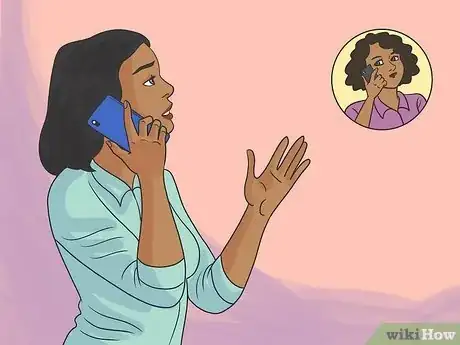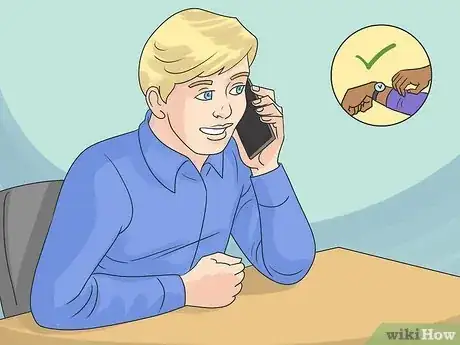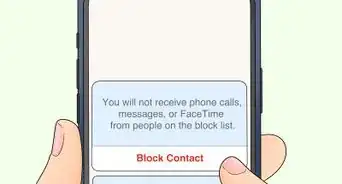This article was co-authored by Amber Rosenberg, PCC. Amber Rosenberg is a Professional Life Coach, Career Coach, and Executive Coach based in the San Francisco Bay Area. As the owner of Pacific Life Coach, she has 20+ years of coaching experience and a background in corporations, tech companies, and nonprofits. Amber trained with the Coaches Training Institute and is a member of the International Coaching Federation (ICF).
There are 7 references cited in this article, which can be found at the bottom of the page.
This article has been viewed 63,108 times.
Sometimes, plans change and you might find yourself having to cancel a plan with a friend. With a little planning and some careful wording, you can reschedule your plans with no hurt feelings!
Steps
Speaking With Your Friend
-
1Let them know immediately. Contact your friend as soon as you decide to cancel. The more notice you can provide them, the better. This will allow them more time to readjust their schedule. This is especially true for last-minute cancellations. Getting in touch with them as soon as you can is the best course of action.[1]
- In some cases, it’s a good idea to give a friend a heads up even if there’s only a chance you’ll have to cancel. This will allow them to make a back-up plan if necessary.
-
2Consider calling on the phone. Reaching out directly indicates that you don’t take cancelling lightly. Calling also makes it easier to gauge your friend’s emotions, which will help you determine how to respond. If they don’t answer, leave a message and follow up with a text or email.
- When cancelling plans well in advance, emailing or texting can be appropriate, especially in more professional contexts. Try to put yourself in the other person’s shoes and use your best judgment when deciding how to contact them. Avoid texting simply because it’s easiest for you.[2]
Advertisement -
3Apologize sincerely. Recognize that someone has made plans for you and you may be wasting their time.[3] Take a moment to consider how upset they’re likely to be based on the circumstances. Friends are likely to be more upset if they spent significant time or effort on these plans. It’s also easier to forgive a close friend than an acquaintance.
- If you think they may be very upset with you, make sure to acknowledge the impact of your actions and express remorse clearly. Apologizing repeatedly may sometimes be necessary, but the initial contact is often your best opportunity to apologize effectively. If you’re nervous, it can be helpful to plan an apology in advance.
- If it’s a less important activity, you should still apologize — but often something like a simple, “Sorry, can’t make it this time!” will suffice.
-
4Provide an excuse. You’ll want to mention why you have to cancel your plans. But avoid giving the impression that a new opportunity is more appealing than spending time with your friend.[4] Don’t try to come up with a long, contrived excuse. Friends can often tell when someone’s not being honest, so tell the truth whenever possible.
- If you feel the need to lie, try to make it realistic. Avoid getting other people caught up in your lie.[5]
-
5Empathize with their emotions. Discussing the other person’s feelings can resolve potential rifts in your relationship. Be ready and willing to hear them out. Make a sincere attempt to understand how you’ve made them feel.
-
6Avoid making the conversation all about you. When cancelling plans, many people tend to be overly self-deprecating, or go on about how busy they are. Try to avoid putting yourself at the center of the conversation. Remember that a good apology is about the other person.[6]
-
7Reimburse your friend for any costs they are incurring. If your friend has already spent money on your plans, it’s a nice gesture to pay for these expenses. They may be wasting a ticket to an event or have already bought supplies that they now don’t need. Offering to cover these costs will help make up for inconveniencing them.
- If you’re leaving your friend with extra tickets, you might offer to take on the burden of finding someone else to buy them.
Rescheduling Plans
-
1Offer to reschedule. Suggest a concrete plan at another time. Avoid putting the burden on your friend to find another way to meet. If appropriate, consider offering to do something nice, like buying them dinner.[7]
-
2Defer to their schedule. If they do have another plan or time for meeting in mind, be as accommodating as possible. Offering to make future plans at their convenience also makes for a nice gesture. Don’t hold it against them if they’re not immediately able to reschedule.
-
3Avoid overbooking yourself. Don’t reschedule if there’s a chance you can’t make subsequent plans. If you’re having a busy week, suggest a future date that will definitely work for you.
- Relationships become strained when one party starts cancelling with regularity. Cancelling is more likely to be met with forgiveness if it’s only on rare occasions.
Not Making It a Habit
-
1Avoid making plans you won’t keep. Saying no to plans may seem unappealing, but it’s easier for everyone involved than a last-minute cancellation.[8] Try not to make plans you’re not genuinely excited about.
-
2Push through when you can. It’s OK to bail on plans when it’s absolutely necessary. But pushing through your exhaustion to make it to events can make a big difference in maintaining healthy relationships with your friends.[9]
-
3Reflect on why you cancelled. Frequently cancelling plans may indicate something else is going on. You might be overwhelmed with a busy schedule. Maybe you don’t truly want to hang out with these friends. Take a moment to reflect on if there is something you’re not admitting to yourself. Try to identify any underlying causes that may be present.[10] If repeatedly cancelling plans is having a significant detrimental effect on your life, consider speaking to a mental health professional.[11]
Expert Q&A
-
QuestionHow do I get out of last-minute plans?
 Amber Rosenberg, PCCAmber Rosenberg is a Professional Life Coach, Career Coach, and Executive Coach based in the San Francisco Bay Area. As the owner of Pacific Life Coach, she has 20+ years of coaching experience and a background in corporations, tech companies, and nonprofits. Amber trained with the Coaches Training Institute and is a member of the International Coaching Federation (ICF).
Amber Rosenberg, PCCAmber Rosenberg is a Professional Life Coach, Career Coach, and Executive Coach based in the San Francisco Bay Area. As the owner of Pacific Life Coach, she has 20+ years of coaching experience and a background in corporations, tech companies, and nonprofits. Amber trained with the Coaches Training Institute and is a member of the International Coaching Federation (ICF).
Pacific Life Coach Try the sandwich approach—start off with a positive, say what you want or need, and end with a positive. For instance, you might say, "I'm really looking forward to hang out with you, and at the same time, I can't make it. Can we please schedule another time to get together." Then, thank the person for understanding.
Try the sandwich approach—start off with a positive, say what you want or need, and end with a positive. For instance, you might say, "I'm really looking forward to hang out with you, and at the same time, I can't make it. Can we please schedule another time to get together." Then, thank the person for understanding. -
QuestionHow do you say no to plans when you don't want to say yes?
 Amber Rosenberg, PCCAmber Rosenberg is a Professional Life Coach, Career Coach, and Executive Coach based in the San Francisco Bay Area. As the owner of Pacific Life Coach, she has 20+ years of coaching experience and a background in corporations, tech companies, and nonprofits. Amber trained with the Coaches Training Institute and is a member of the International Coaching Federation (ICF).
Amber Rosenberg, PCCAmber Rosenberg is a Professional Life Coach, Career Coach, and Executive Coach based in the San Francisco Bay Area. As the owner of Pacific Life Coach, she has 20+ years of coaching experience and a background in corporations, tech companies, and nonprofits. Amber trained with the Coaches Training Institute and is a member of the International Coaching Federation (ICF).
Pacific Life Coach If you find yourself having a hard time saying no, it may be helpful to examine your personal boundaries and determine where they need strengthening. For example, ask yourself questions like, "How free do I feel to express myself?" and "How free do I feel to ask for what I want?" When you have strong boundaries, you're able to ask for what you want and need; say no without feeling guilty; and buffer yourself from other people's moods and what they say or do.
If you find yourself having a hard time saying no, it may be helpful to examine your personal boundaries and determine where they need strengthening. For example, ask yourself questions like, "How free do I feel to express myself?" and "How free do I feel to ask for what I want?" When you have strong boundaries, you're able to ask for what you want and need; say no without feeling guilty; and buffer yourself from other people's moods and what they say or do. -
QuestionWhat if my friend keeps cancelling plans? I am getting sick of it.
 Community AnswerHonestly, she may be trying to end the friendship. Try talking to her and asking her what's going on. Don't pick a fight, just calmly tell her you've noticed she keeps canceling plans with you, and you're wondering if something is wrong or if she wants to end the friendship. At least you'll know what's going on.
Community AnswerHonestly, she may be trying to end the friendship. Try talking to her and asking her what's going on. Don't pick a fight, just calmly tell her you've noticed she keeps canceling plans with you, and you're wondering if something is wrong or if she wants to end the friendship. At least you'll know what's going on.
References
- ↑ http://www.thefrisky.com/2013-09-04/the-dos-donts-of-gracefully-canceling-plans/
- ↑ http://www.nytimes.com/1986/07/21/style/relationships-canceling-plans-with-friends.html
- ↑ http://lifehacker.com/5919163/how-to-flake-out-on-someone-gracefully
- ↑ http://lifehacker.com/5919163/how-to-flake-out-on-someone-gracefully
- ↑ http://www.thefrisky.com/2013-09-04/the-dos-donts-of-gracefully-canceling-plans/
- ↑ https://mic.com/articles/113138/there-s-a-modern-problem-afflicting-our-friendships-and-it-s-time-to-talk-about-it#.OCBhWUxIj
- ↑ http://www.thefrisky.com/2013-09-04/the-dos-donts-of-gracefully-canceling-plans/
- ↑ https://www.themuse.com/advice/how-to-cancel-plans-at-the-last-minute-professionallyand-without-burning-any-bridges
- ↑ https://www.psychologytoday.com/blog/friendship-20/201205/yes-you-might-be-flake
About This Article
Once you’ve decided to cancel your friends, contact your friend immediately so they have time to readjust their schedule. Consider reaching out directly on the phone, and be sure to apologize sincerely and emphasize with their emotions. Offer to reschedule and, if you can, try to defer to their schedule. Don’t make cancelling plans a habit and try to push through when you can to maintain healthy relationships with your friends, but avoid making plans you won’t keep. If you are looking for more tips on how to politely cancel plans with a friend, keep reading.








































































